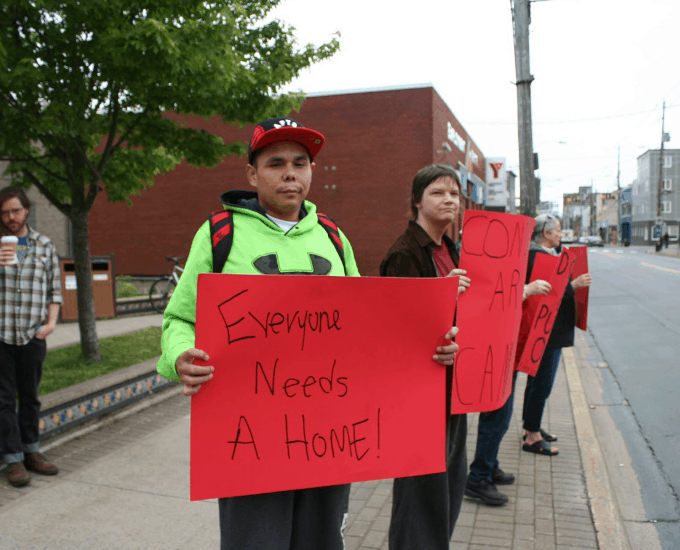
KJIPUKTUK (Halifax) – With the eviction moratorium widely expected to end on July 1st, as many as 2,000 Nova Scotia households may face eviction for rent arrears or other reasons.
That at least is the number mentioned by Kevin Russell, Executive Director of the Investment Property Owners Association of Nova Scotia in an article by Lindsay Armstrong for All Nova Scotia. Some housing activists believe that number could be as high as 6,000.
The moratorium was put in place by the provincial government to protect tenants from evictions because of circumstances directly related to the COVID-19 pandemic.
The lifting of that moratorium, and the resumption of Tenancy Board hearings could have devastating consequences for many tenants who were unable to pay their full rent because of financial pressures.
Two organizations are fighting back.
This Friday June 26 ACORN Nova Scotia is organizing a phone zap at noon, demanding a full ban on evictions because of COVID19 and a rent grant program to help tenants pay off arrears. And on Tuesday June 30 at 1 PM the organization for low income people will hold a rally at Province House.
Meanwhile, Dalhousie Legal Aid, is asking people and organizations to sign a letter that seeks adoption by the province of its Eviction Prevention Plan for Nova Scotia. This initiative calls on the government to put in place protective measures for renters during, and after the COVID-19 pandemic, especially around evictions.
“The economic impacts of the pandemic have fallen hardest on low-wage workers in the service sector, a workforce composed disproportionately of women, immigrants, and racialized persons. Half of those Canadians who earned $16 or less lost their job or the majority of their hours between February and April.2 The Canadian Emergency Response Benefit (CERB) has softened the blow but with monthly payments amounting to only $12 per hour, the CERB has failed to fully replace lost incomes. Further exacerbating this financial hardship is the fact the some 16% of unemployed workers remain ineligible for the CERB,” the Dalhousie Legal Aid document states.
“6,000 tenants on the street, that’s a pretty staggering number. It’s a real concern to see these numbers, knowing that there is the potential of a second COVID-19 wave, and a second lockdown,” says Mila McKay, an ACORN Nova Scotia spokesperson.
ACORN is demanding a full ban on evictions due to rental arrears because of COVID-19 related financial hardship. It also, much like Dalhousie Legal Aid, wants the government to set up a payment program through the residential tenancies board. It is also lobbying for a provincial rent grant program to help low income tenants pay back rental arrears due to COVID-19.
“First and foremost, for us housing is a human right,” says McKay. “But consider also the tremendous pressure on shelters. If there’s anything we’ve learned from the first COVID-19 wave is that you don’t want people in shelters, and you also don’t want people couchsurfing for that matter.”
“Quite a few of our members have received eviction notices, others have received very large rent increases. We already live in a province and in a city with high rents, and we continue to hear about predatory behavior by some landlords who are increasing rents to extreme levels.”
Contact ACORN Nova Scotia at halifax1@AcornCanada.org. To sign off on the Dalhousie Legal Aid proposal email mark.culligan@dal.ca
See also: News brief: Rent poor in Nova Scotia
With a special thanks to our generous donors who make publication of the Nova Scotia Advocate possible.
Subscribe to the Nova Scotia Advocate weekly digest and never miss an article again. It’s free!



